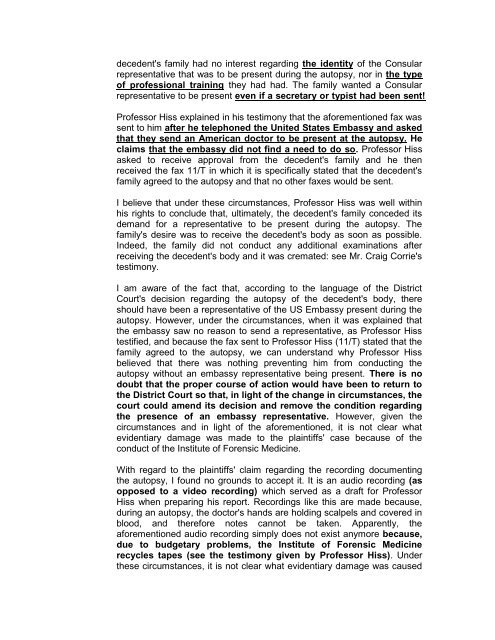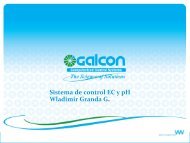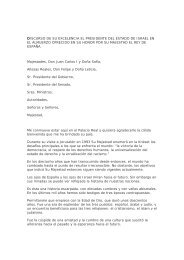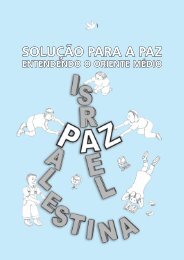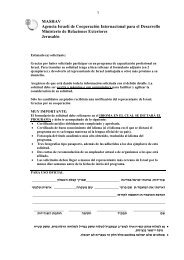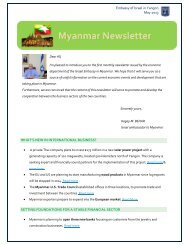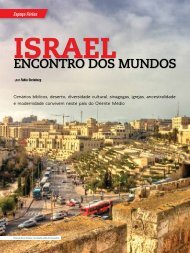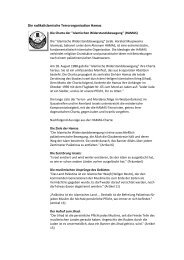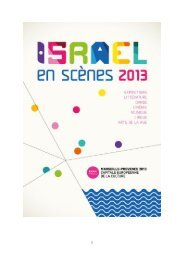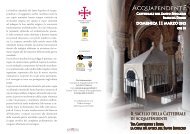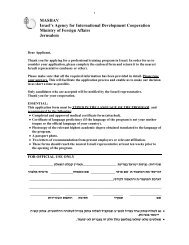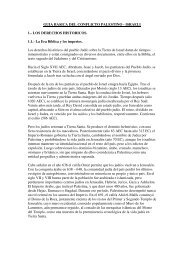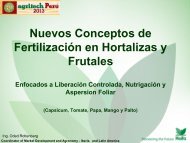Summary of the Verdict (TA 371/05) Estate of the Late Rachel Corrie ...
Summary of the Verdict (TA 371/05) Estate of the Late Rachel Corrie ...
Summary of the Verdict (TA 371/05) Estate of the Late Rachel Corrie ...
Create successful ePaper yourself
Turn your PDF publications into a flip-book with our unique Google optimized e-Paper software.
decedent's family had no interest regarding <strong>the</strong> identity <strong>of</strong> <strong>the</strong> Consular<br />
representative that was to be present during <strong>the</strong> autopsy, nor in <strong>the</strong> type<br />
<strong>of</strong> pr<strong>of</strong>essional training <strong>the</strong>y had had. The family wanted a Consular<br />
representative to be present even if a secretary or typist had been sent!<br />
Pr<strong>of</strong>essor Hiss explained in his testimony that <strong>the</strong> aforementioned fax was<br />
sent to him after he telephoned <strong>the</strong> United States Embassy and asked<br />
that <strong>the</strong>y send an American doctor to be present at <strong>the</strong> autopsy. He<br />
claims that <strong>the</strong> embassy did not find a need to do so. Pr<strong>of</strong>essor Hiss<br />
asked to receive approval from <strong>the</strong> decedent's family and he <strong>the</strong>n<br />
received <strong>the</strong> fax 11/T in which it is specifically stated that <strong>the</strong> decedent's<br />
family agreed to <strong>the</strong> autopsy and that no o<strong>the</strong>r faxes would be sent.<br />
I believe that under <strong>the</strong>se circumstances, Pr<strong>of</strong>essor Hiss was well within<br />
his rights to conclude that, ultimately, <strong>the</strong> decedent's family conceded its<br />
demand for a representative to be present during <strong>the</strong> autopsy. The<br />
family's desire was to receive <strong>the</strong> decedent's body as soon as possible.<br />
Indeed, <strong>the</strong> family did not conduct any additional examinations after<br />
receiving <strong>the</strong> decedent's body and it was cremated: see Mr. Craig <strong>Corrie</strong>'s<br />
testimony.<br />
I am aware <strong>of</strong> <strong>the</strong> fact that, according to <strong>the</strong> language <strong>of</strong> <strong>the</strong> District<br />
Court's decision regarding <strong>the</strong> autopsy <strong>of</strong> <strong>the</strong> decedent's body, <strong>the</strong>re<br />
should have been a representative <strong>of</strong> <strong>the</strong> US Embassy present during <strong>the</strong><br />
autopsy. However, under <strong>the</strong> circumstances, when it was explained that<br />
<strong>the</strong> embassy saw no reason to send a representative, as Pr<strong>of</strong>essor Hiss<br />
testified, and because <strong>the</strong> fax sent to Pr<strong>of</strong>essor Hiss (11/T) stated that <strong>the</strong><br />
family agreed to <strong>the</strong> autopsy, we can understand why Pr<strong>of</strong>essor Hiss<br />
believed that <strong>the</strong>re was nothing preventing him from conducting <strong>the</strong><br />
autopsy without an embassy representative being present. There is no<br />
doubt that <strong>the</strong> proper course <strong>of</strong> action would have been to return to<br />
<strong>the</strong> District Court so that, in light <strong>of</strong> <strong>the</strong> change in circumstances, <strong>the</strong><br />
court could amend its decision and remove <strong>the</strong> condition regarding<br />
<strong>the</strong> presence <strong>of</strong> an embassy representative. However, given <strong>the</strong><br />
circumstances and in light <strong>of</strong> <strong>the</strong> aforementioned, it is not clear what<br />
evidentiary damage was made to <strong>the</strong> plaintiffs' case because <strong>of</strong> <strong>the</strong><br />
conduct <strong>of</strong> <strong>the</strong> Institute <strong>of</strong> Forensic Medicine.<br />
With regard to <strong>the</strong> plaintiffs' claim regarding <strong>the</strong> recording documenting<br />
<strong>the</strong> autopsy, I found no grounds to accept it. It is an audio recording (as<br />
opposed to a video recording) which served as a draft for Pr<strong>of</strong>essor<br />
Hiss when preparing his report. Recordings like this are made because,<br />
during an autopsy, <strong>the</strong> doctor's hands are holding scalpels and covered in<br />
blood, and <strong>the</strong>refore notes cannot be taken. Apparently, <strong>the</strong><br />
aforementioned audio recording simply does not exist anymore because,<br />
due to budgetary problems, <strong>the</strong> Institute <strong>of</strong> Forensic Medicine<br />
recycles tapes (see <strong>the</strong> testimony given by Pr<strong>of</strong>essor Hiss). Under<br />
<strong>the</strong>se circumstances, it is not clear what evidentiary damage was caused


